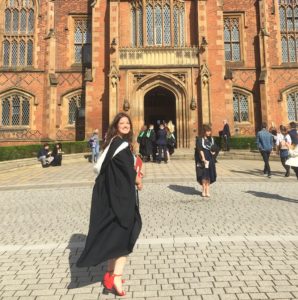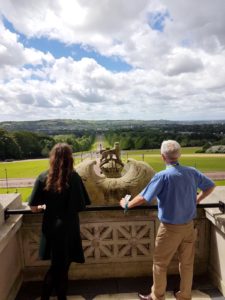Previously in our Northern Roots series we’ve spoken to readers originally from Northern Ireland but currently living elsewhere. Now we’re doing things the other way around. This week we speak to Frances Neilson, from England and studied at Queen’s University. After spending time in Scotland she has returned to NI for a few months. You can follow Frances on Twitter @QueenofFranter.
1. Tell us about yourself. When did you move to Northern Ireland, and where from? What do you do now?
I was born in Cambridge to very proudly Yorkshire parents but since 2002 the Northamptonshire village of Walgrave has been my home. One pub, no shops, no traffic lights, a Victorian primary school, a lot of fields, and everyone knows everyone – it was the perfect place to grow up. I moved to Belfast in 2014 to study for a BA in Politics at Queen’s University. I graduated in 2017 and then moved to Scotland to study for a Masters degree in Peace and Conflict Studies at the University of St Andrews – which I have just completed. I have now returned to Northern Ireland for three months to take up an internship opportunity. For the past 18 months I have also been volunteering at the not-for-profit organisation Pens For Kids UK which I’ve managed communications for.
2. What perceptions did you have of Northern Ireland before you came here? Have they changed?
This reflects extremely poorly on both myself and what I was taught at school, but I didn’t know anything about Northern Ireland before I moved here. I looked around Queen’s on a rainy day in January and was seduced by the beauty of the Lanyon building and the novelty of being a plane journey away from home for university. The baggage that comes with living in Northern Ireland was not something I knew about, and therefore wasn’t factored into my decision of whether to accept my offer at Queen’s. In some way that was a good thing as it meant I moved to Belfast with an open mind.
Equally though, it is disgraceful that I had reached the age of 19 having never heard of the Good Friday Agreement, or the DUP, or that I was about to move to a country that I didn’t know had no same-sex marriage or legalised abortion – I just assumed it was the same as the rest of the UK. I found the barrage of acronyms for the political parties and paramilitary organisations particularly overwhelming.
From knowing nothing about Northern Ireland to suddenly living the experience, studying both the Troubles and the peace process, and having many interesting conversations with taxi drivers, what (pleasantly) surprised me most was that in three years no one ever had a problem with me because I am English. I certainly felt uncomfortable in tutorials being the only English person, and sometimes the only female, listening to angry young men recount stories of their families’ experiences during the Troubles; I also had people assume on several occasions that because I am English, and I have a Scottish surname, I would strongly feel a certain way about the Troubles, but there was never a bitterness to that assumption. People make Northern Ireland and I’m yet to meet kinder, funnier, more hospitable people.

3. Are you hopeful for Northern Ireland’s future? Will Brexit make a difference?
I have enormous faith and pride in the people of Northern Ireland, and so I try to believe the future is positive. However, I have found it increasingly difficult to maintain this belief since the result of the referendum on the UK’s membership in the EU. In 2016, I had flown home to vote and when the Brexit result came in, I cried in my Mum’s arms, furious that the people of England and Wales had seemingly voted to leave the EU without any regard for what this actually meant.
Given my own previous lack of knowledge on Northern Ireland, it didn’t surprise me that in the weeks and months following the referendum that stories emerged of people who had voted to leave without even realising we had a border with the EU, and, more importantly, didn’t understand the complex history, violence, and symbolism of that border. I firmly believe Brexit to be a monumental error and a colossal waste of everyone’s time. For Northern Ireland especially, it is not just a waste of time, but a threat to peace.
From my experiences, the only good thing to have come from Brexit seems to be that the rest of the UK is talking about Northern Ireland more; my friends and family ask me about Northern Irish politics more. People know about the Border now; the abortion rights campaign appears to be gaining traction. Or rather, those old enough to remember the Troubles have had their Northern Irish knowledge expanded beyond the bombs and the IRA. This wider knowledge of Northern Irish issues has the potential to be a force for positive change – maybe this will be the beginning of the rest of the UK involving itself more with Northern Irish issues.
Setting Brexit aside, what would make me most hopeful for Northern Ireland’s future would be the removal of the system of segregated education and making integrated education the norm rather than the exception.
4. You left Northern Ireland but are planning on returning – what made you come back?
After finishing at St Andrews, I faced the classic dilemma of being over-educated but under-experienced. I saw an internship opportunity in Belfast which excited me and Northern Ireland, generally, is in an exciting period – the next few months are going to be interesting to say the least.
On a more personal note, two of my best friends still live in Belfast, and I was very involved with Windsor Tennis Club throughout my three years studying at Queen’s. I have a whole life here that I can easily fall back into. The chance to spend a few months back in Belfast, while gaining valuable experience, is the perfect way for me to end a tricky year.
Will I stay in Northern Ireland? The simple answer is I would if I could. Like so many people who leave Northern Ireland, I fear the employment opportunities I am looking for are just not going to be available in Belfast. I will happily settle for a career in Glasgow or Edinburgh should Belfast prove impossible.
Thinking further into the future, I am not sure if I want children but if I were to have them I would have to consider very carefully whether I would want to raise them in Northern Ireland. As I said in my previous answer, I am a strong proponent of integrated education. Given the minority of integrated schools currently, I am not sure that the current environment is one I would want my children to grow up in. But a lot could change over the next decade or so, and I hope it does!

5. What can Northern Ireland learn from the place you are from? What can the place you’re from learn from Northern Ireland?
The sense of community in Walgrave is wonderful. As far as my experiences of Northern Ireland go, the divisions between communities aren’t that obvious when talking to people on a one-to-one basis. But the physical divisions of the ‘peace walls’ in Belfast, and the obsessive demarcation of boundaries with flags is something that saddens me greatly, as much as I understand the history, and thus supposed ‘need’ behind it. I’d love to see a shared community identity emerge in Northern Ireland that isn’t based on religion, or political opinion, or nationality – although that is a mightily complex ask and far easier said than done. I certainly don’t have a plan for how to achieve that!
I think I’ve stressed the point that England (and most likely the rest of Great Britain also) need to do a better job of understanding and teaching the history of Northern Ireland.
6. If Northern Ireland had a president with sweeping powers, and it was you, what would you do?
There’s a lot of things I would be tempted to do, but I don’t believe I, or anyone, should have that much power. Democracy is so much more powerful and legitimate than autocracy. If attempts at resurrecting power-sharing failed I would establish more citizens’ assemblies – definitely one on Brexit!
7. What would you like to see more of on Northern Slant?
I really like the content on Northern Slant, so I wouldn’t remove anything. The only thing I can think that is missing is maybe a broader coverage/interviews of grassroots political movements. Or even interviews with those who are going against the stereotypes. For example, I would love to see some content of those in East Belfast who attend night classes to learn Irish.

8. If you could ask three Northern Ireland politicians (past or present) to dinner, who would they be? And why?
I have to give preference to current politicians; namely, Arlene Foster and Michelle O’Neill. They are two of the most important politicians in Northern Ireland, and if anyone is going to resolve the stalemate at Stormont it’s these two. Also, I’d love to pick the brains of two such powerful female politicians. It’s fantastic that the leaders of the DUP, Alliance, Scottish Conservatives, Conservatives, Green Party (UK joint leader), Sinn Féin (in Northern Ireland), and the SNP are all female – I hope I haven’t missed any! So, I’d have Arlene and Michelle over, they’d experience my terrible vegetarian cooking skills, we’d debate it all, and to referee the whole meal I’d have the late, great Mo Mowlam. We could really use her now.
9. Do you have a favourite quote, or mantra?
‘The arc of the moral universe is long, but it bends toward justice’ – Martin Luther King Jr.
While an MLK quote, it was popularised by President Obama throughout his two terms in Office. Anyone who knows me well knows that I have been a big Obama fan since 2008. As I’ve grown up, I’ve become less supportive of some of the Obama Administration’s foreign policy strategies but, overall, I’ve maintained the belief that Obama is one of the good ones. Every time I’ve heard him quote this MLK line, I have been reassured that while history doesn’t move in straight lines, and post-2016 we’ve been somewhat on the back foot, we are generally heading in the right direction.
10. What’s your message for the people of Northern Ireland?
Thank you for everything. I consider Northern Ireland home, and it’s not because of the place so much as the people.
Also published on Medium.
